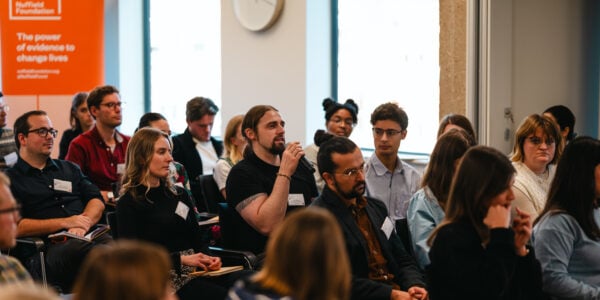
12/07/23
4 min read
We want to work with researchers, policymakers and practitioners to define our future priorities
The Nuffield Foundation is setting a new strategy and we are launching a year-long programme of consultation with our stakeholders. Beginning in July 2023, the Changing lives for the better programme will invite researchers, policymakers and practitioners from different disciplines and institutions to a series of events to help us set our new strategy, and fund the research best placed to improve people’s lives.
We are committed to increasing our spending by £30m to £130m over the next five years. However, in the agenda we want to explore, we are thinking across the next twenty years.
Our purpose
The Nuffield Foundation was founded in 1943, 80 years ago. Our challenge is to re-shape for the 21st century the Foundation’s original objects – the advancement of social well-being, the advancement of education, the relief of disability and the challenges of ageing. Life in Britain today is in many ways unrecognisable to that of the mid-20th century – in its diversity and demography, the structure of work, families and communities, and the accelerating impact of technology.
But there are also persistent themes that connect the present to the past – access to opportunities, inequalities, education and the fairness of the justice system. The challenge of Nuffield’s research is to produce that shock of understanding as to what sort of society we are becoming and to help change it for the better.

Our approach
Nuffield looks to its grant-holders to define these questions and identify the evidence from the available data. Nuffield’s mindset is primarily empirical. It believes in the power of evidence to change lives and is concerned with the complex trade-offs around the most intractable challenges to social policy. But our purpose is also underpinned by a normative framing identifying the foundations, obstacles and pathways to a just and inclusive society that no policy programme should ignore. We do not fund advocacy, but we do expect research to trace a direct line to the improvement of people’s lives, especially those of the least advantaged. Our best projects connect the rigour of quantitative analysis to the disciplines of qualitative research, extracting and testing the data but never reducing the lived experience buried in that data to a set of graphs and numbers.
Our best projects connect the rigour of quantitative analysis to the disciplines of qualitative research, extracting and testing the data but never reducing the lived experience buried in that data to a set of graphs and numbers.Tim Gardam, CEO
As we scan the horizon, we believe certain definitional questions will persist – the extent to which a largely prosperous society can manage aspects of inequality and the risks across the life course, from the early years into old age. Our research ranges across questions of income, wealth, education, public health and disability. It should consider geography, class, gender and race, and intergenerational differences – the intersectionality that recognises people live in many different social categories at one time. Our projects interrogate public policy outcomes – the idiom of government – but they can also be most telling when they map the intermeshed experiences of our diverse communities and how they shape individual lives.
Childhood and education have always been Nuffield’s core interests; identifying the different threads in a child’s life that determine educational opportunity and attainment. The Nuffield Family Justice Observatory provides empirical evidence to inform decision-making about our most vulnerable children. The Justice system is central to our interests. If it does not offer access to redress and protect the individual’s rights in relation to the state, then trust in a just society may be compromised and the basis for social well-being will flounder. In all these ways, we bring into focus the different aspects of the relationships between a caring and a productive society.
A society shaped by artificial intelligence and climate change
In the idealism of post war Britain, Nuffield research, notably in computing and genetics, reflected a belief that the advancement of social well-being would be shaped by advances in science. Eighty years on, we are at a point where the scale of technological impact, in genomics and artificial intelligence, and the intrusion of digital systems into all aspects of our lives shape any question we now ask of how society might work and fit together.
The Nuffield Council on Bioethics, founded in 1993, and the Ada Lovelace Institute, founded in 2018, are the two pillars on which we can develop an agenda that will increasingly be integral to all our work. The urgency of the debate on artificial intelligence is driven by existential questions but there are also more applied questions concerning the potential benefits and risks of these technologies to the provision of education, public health, welfare, care and justice.
Nuffield in the future must encourage research programmes that connect the algorithmic logic of data science to the wicked questions of social science, within robust ethical thinking. How do we ensure digitally determined solutions bring benefits and also take account of individual experience and cultural difference?
Similarly, one cannot consider our social welfare if one does not take account of how the rapidity of climate change bears down on questions of social geography, inequality and disadvantage, and how a just transition to a net zero society must be an inextricable part of the wider determinants of a just society.

A partnership with those we fund and who use our research
As a funder, we can set out our ambitions, but it will be our grant-holders and partners who will refine the research questions. We have worked with some partners over many years; we also are looking for new talent who recognise and represent the diversity and changing character of our society. Over the coming months we want to co-create our programme: Changing lives for the better: priorities for the next twenty years.
We want to create a network of researchers from across different disciplines, inside our universities and beyond, those in local, regional and national government, in civic society, in policy formulation and professional practice. We need to connect with the creativity of those in business and enterprise who will define employability and skills of the future, and those working within the fabric of our diverse communities. We encourage you all to come forward with the most salient and urgent research questions society needs to answer.
We want to hear from you
Find out more about our Changing lives for the better programme
Or get in touch to share your thoughts and ideas for our future priorities.
We look forward to hearing from you.








